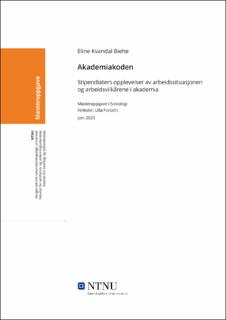| dc.contributor.advisor | Forseth, Ulla | |
| dc.contributor.author | Biehe, Eline Kvandal | |
| dc.date.accessioned | 2021-09-28T17:30:02Z | |
| dc.date.available | 2021-09-28T17:30:02Z | |
| dc.date.issued | 2020 | |
| dc.identifier | no.ntnu:inspera:54523496:37885848 | |
| dc.identifier.uri | https://hdl.handle.net/11250/2784447 | |
| dc.description.abstract | Temaet for denne masteroppgaven omhandler stipendiaters opplevelser av arbeidssituasjonen og arbeidsvilkårene i akademia. Utgangspunktet for oppgaven er et kvalitativt forskningsdesign, bestående av åtte dybdeintervjuer med stipendiater ansatt ved NTNU. Problemstillingen som tas opp er:
Hvordan opplever stipendiater arbeidssituasjonen og arbeidsvilkårene i akademia?
Det teoretiske rammeverket for oppgaven tar for seg perspektiver innen kunnskapsarbeid, hvor Alvessons (1995, 2000, 2001, 2014) teorier om kunnskapsarbeid står som sentrale bidrag. Begreper som grenseregulering (Hochschild 1983,1997, Forseth 2010,2020), resultatmålinger (Rasmussen, Sætnan og Tøndel 2019, Rasmussen 2017), akademisk autonomi (Rasmussen 2011, Nebb 2011) og prekariatet (Standing 2014, Eldring og Ørjasæter 2018) har bidratt med perspektiver innen akademisk arbeid og til konkretisering av problemstillingen.
Gjennom oppgaven belyses flere ulike sider av stipendiatarbeidet, for å få frem konteksten som stipendiatarbeidet foregår innenfor, og for å belyse stipendiatenes opplevelser av arbeidssituasjonen og arbeidsvilkårene i akademia. Studien viser at det er forskjeller i hvordan stipendiatene opplever arbeidssituasjonen og arbeidsvilkårene. Arbeidsoppgavene preges av både strategisk styring fra toppen, samtidig som stipendiatene må forholde seg til sine nærmeste ledere og kolleger. Mine funn viser at hver enkelt stipendiat skaper egne strategier for hvordan de best mulig kan gjennomføre doktorgradsløpet, med best mulig utfall.
Autonomi og valgfrihet er spesielle kjennetegn for akademia som arbeidsplass, og det er også noe informantene trekker frem som en positiv side av arbeidet. Samtidig viser min studie at stipendiatenes strategier (til en viss grad) styres av de strukturelle føringene, og dette går på bekostning av den angivelige valgfriheten de disponerer. De har for eksempel muligheten til å velge om de skal skrive på engelsk eller norsk, artikkelbasert eller monografi, og de har muligheten til å bestemme om de ønsker mer eller mindre undervisning utover det som inngår i pliktarbeidet. Samtidig vet de hva som er strategisk smart i forhold til akademiakoden, og velger også deretter. | |
| dc.description.abstract | The theme for this master´s thesis explores PhD-candidates experience of the work situation and working conditions in academia. The starting point for the thesis is a qualitative research design consisting of eight in-depth interviews with PhD-candidates employed at NTNU.
The research question is as following:
How do PhD-candidates experience the work situation and working conditions in academia?
The theoretical framework for the thesis addresses perspectives in knowledge work, where Alvessons´s (1995, 2000, 2001, 2014) theories of knowledge work are central contributions. Concepts such as boundary regulation (Hochschild 1983, 1997, Forseth 2010, 2020), performance measurements (Rasmussen, Sætnan og Tøndel 2019, Rasmussen 2017), academic autonomy (Rasmussen 2011, Nebb 2011) and the precariat (Standing 2014, Eldring og Ørjasæter 2018) have contributed with perspectives in academic work and in defining the research question.
The thesis highlights several different aspects of the PhD work, in order to highlight the context within which the PhD work is conducted, and to elucidate the PhD student's experiences of the work situation and working conditions in academia. The study shows that there are differences in how the fellow students experience the work situation and working conditions. The duties are characterized by both strategic management from the top, while the PhD-candidates must relate to their immediate leaders and colleagues. Based on the structural guidelines in academia, each PhD-candidate creates their own strategies for how best to carry out the doctoral program, with the best possible outcome.
Autonomy and freedom of choice are special characteristics of academia as a workplace, and it is also something my informants point out as a positive side of the work. At the same time, my study shows that the PhD-candidates´ strategies (to some extent) are guided by the structural guidelines, and this is at the expense of the alleged freedom of choice they have at their disposal. They have the opportunity to choose whether to write in English or Norwegian, article-based or monograph, and they have the opportunity to decide whether they want more or less teaching beyond what is included in the compulsory work. At the same time, they know what is strategically smart in relation to the academy code, and they choose accordingly. | |
| dc.language | | |
| dc.publisher | NTNU | |
| dc.title | Akademiakoden | |
| dc.type | Master thesis | |
